#Gríma Wormtongue
Text

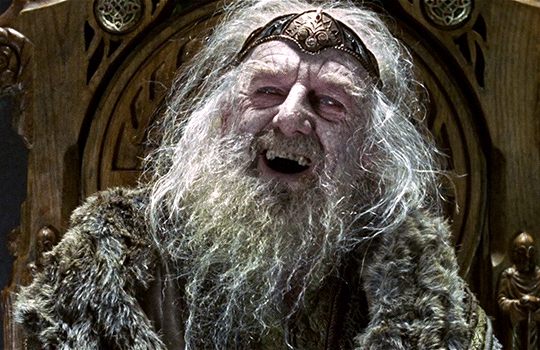

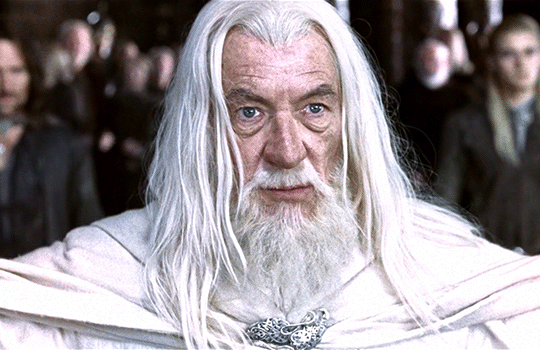


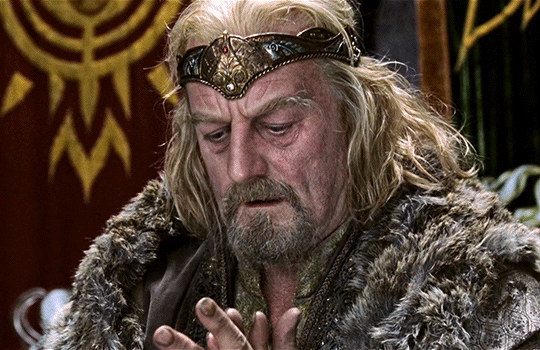

2 March: Gandalf heals King Théoden
#the lord of the rings#the two towers#lotr#lotredit#tolkienedit#lotrcolors#gandalf#theoden#théoden#grima wormtongue#gríma wormtongue#byaster#ch:gandalf#ch:théoden#ch:gríma#movie:the two towers#movie:the lord of the rings
243 notes
·
View notes
Text
Eowyn surrounded by Grímas awful appearances 🌟🗡️🤢
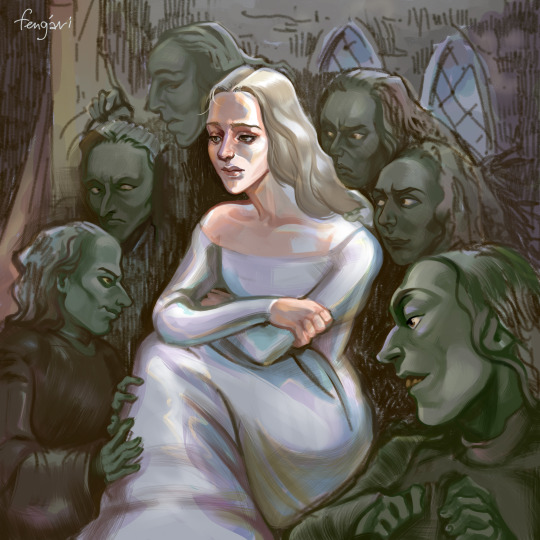
-----------------
Eowyn | LOTR
54 notes
·
View notes
Text
#grima#gríma wormtongue#lord of the rings#silmarillion#tolkien#jrr tolkien#lotr#fantasy#lotr poll#lord of the rings poll#tolkien polls#the silmarillion
45 notes
·
View notes
Text

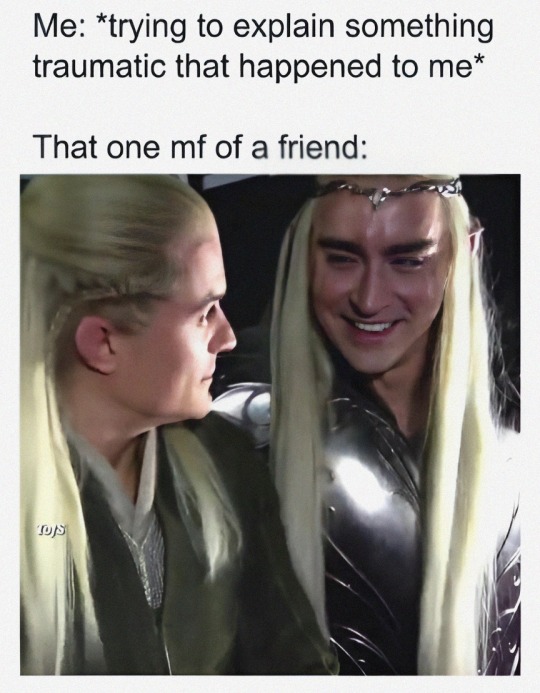



#thranduil#the hobbit#my edits#lee pace#the hobbit botfa#legolas#orlando bloom#kili and tauriel#aiden turner#evangeline lilly#fili#dean o'gorman#gríma wormtongue#brad dourif
84 notes
·
View notes
Text
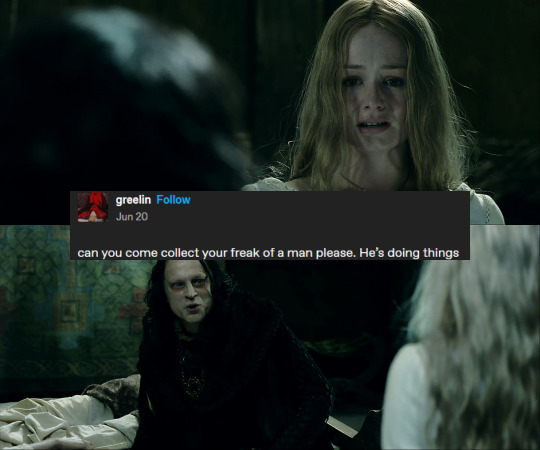
incorrect lord of the rings quotes
↳ "can you come collect your freak of a man please. He's doing things"
#lord of the rings#the lord of the rings#lotr#eowyn#éowyn#grima wormtongue#gríma wormtongue#incorrect quotes#incorrect lotr#incorrect lord of the rings#bee makes.#bee.png
54 notes
·
View notes
Photo
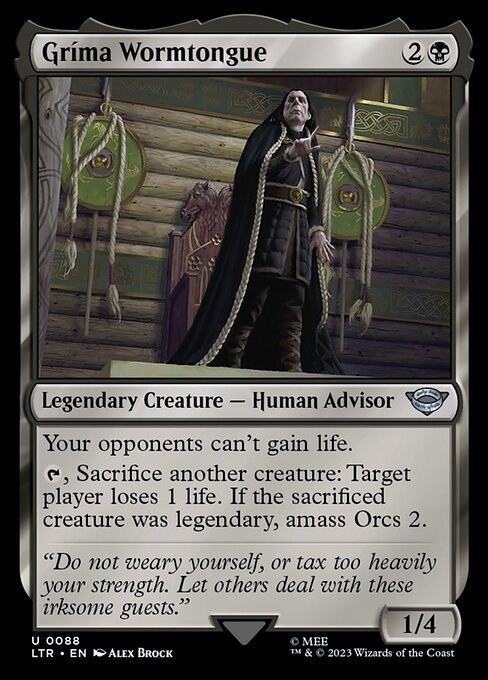
Gríma Wormtongue
"Do not weary yourself, or tax too heavily your strength. Let others deal with these irksome guests."
Artist: Alex Brock
TCG Player Link
Scryfall Link
EDHREC Link
#mtg#magic the gathering#tcg#$0.07#alex brock#gríma wormtongue#the lord of the rings: tales of middle-earth#legendary#creature#human#advisor
24 notes
·
View notes
Text
Gríma: "Everyone's allergic to poison."
7 notes
·
View notes
Text
Into the Breach (pt. 2 of 4)
Here’s part 2 of my sort-of fic/sort of extended HC about what Théodred was doing in the immediate lead-up to LOTR events, along with some tangents into his backstory. (Part 1 is here.) Some of the tangents in this part address his relationship with Théoden, his feelings about being heir, and how Gríma ended up working for the king. I’m just gonna burn through these parts this week because it’s all been written for a long time already, so why not?

The sun had yet to fully rise in Edoras and the night guards were still at their posts around the city, but Théodred’s day had already begun. His pre-dawn visit from Éomer had left him feeling a little shaken, and going back to sleep at that point would have been impossible. Instead, he slipped out to take a walk in the early morning winter chill, hoping both to clear his mind and to fill the time before Háma would report for duty and could answer some of his most pressing questions.
Storbar loped along at the prince’s side, the dog’s fearsome size keeping the few early morning risers at a distance from the pair as they made several long, slow passes of the fields and meadows at the edge of the city. All the while, Théodred agonized over Éomer’s account of the king’s current condition, so much worsened since his last visit to Edoras. He couldn’t reconcile the withered, faltering invalid of Éomer’s description with the spirited, loving father of his memories or even with the fatigued, weakened man Théodred had last seen three weeks ago.
Perhaps if duty had not so often called him away, he could have better anticipated this turn and done something to stop it. He could have dedicated himself wholly to the care of his ailing father, as any normal son would and could do. Not for the first time, Théodred felt a small ember of resentment burning at the back of his mind. His love for Rohan ran deep in his soul, born into him and a fundamental part of his being, but he could not deny that he sometimes wondered whether the sacrifices asked of him as heir were too steep to be endured. The loss of precious time with his loved ones or the ability to watch over them with closer vigilance. The imperative to always yield his own needs to those of the country. The burden of regularly making decisions that had life or death consequences and of knowing just how closely they all lived to the precipice of disaster, where just a single ill turn could send them careening into chaos and destruction of a sort that most people never even imagined.
This undercurrent of resentment had been the source of the only true conflicts he ever had with his father. Théodred understood and accepted those sacrifices that were necessary to protect the greater good, to guarantee the lives and livelihoods of the Rohirrim as a people, but he balked at any demands of royal life that seemed to exist only to control him as a person. That protocol and tradition should have any say in when and who he married, in what took place in the privacy of his own bedchamber, in whether and when he would have children…these things never sat right in his mind, and his resistance to them distressed Théoden, who saw himself as guardian both of the physical welfare of Rohan but also of all of its customs and culture. They clashed repeatedly over Théodred’s attempts to claim more autonomy for himself and for others in the royal family who sought their own concessions from the unnecessary strictures of court life.
The most bitter of their fights had been when Théodred refused an appropriate and politically advantageous marriage at the age of twenty five, unwilling to join himself for the rest of his years to a woman he hardly knew and felt no real affection for. Théoden had argued that affection would come in time, as it had when he married Elfhild as a young man, but Théodred would not make such a gamble with his own happiness. And when Théoden had angrily invoked the needs of the kingdom, the obligation to produce an heir for the next generation, Théodred had only thrown fuel on the fire by then confessing that he felt no real call to fatherhood and would happily pass on the throne to his cousins’ line, in which he had the utmost confidence. Though Théoden ultimately yielded rather than force his son into an unwilling marriage, they spent many months unable to speak to each other with the ease and warmth that had otherwise always characterized their relationship.
But as harsh as this and other disagreements had sometimes been, neither truly wanted to be at odds with the other. They had always somehow found a way back together, to the little two-person unit they had been ever since the day Théodred had come into the world and Elfhild had left it. In all their differences of opinion, their fragile agreements to leave certain subjects untouched, their hesitant attempts to make compromises and concessions on the other’s behalf, there was never any question of love, loyalty or dedication. All of which made Théodred’s new reality–that his father was gravely and perhaps fatally ill–that much harder to stomach. He had faced loss and grief many times before, but this loss was almost more than he could contemplate. No matter his age and strength and experience, losing his father would leave him feeling like an orphan, cut free from the last moorings that connected him to the long line of his history. Staring down that possibility now darkened his spirits even as the light of dawn slowly spread over the hills and fields around him.
When the sun had finally risen in earnest and Edoras began to bustle with activity, he returned Storbar to Eadlin and walked around to the entrance of the great hall, where Háma would be at his post. He soon caught sight of the doorwarden, seated in a stone chair with his sword laid across his knees. Though he appeared motionless, his eyes constantly swept the terrace in front of him and his ears were carefully attuned to any activity in the hall behind him. Théodred knew there wasn’t another man in Rohan who was better informed about happenings at court than Háma. Nor was there another who took his duty to his country with more seriousness. His loyalty was legendary and had seen him climb the ranks to captain of the guard with unprecedented speed, but his faithfulness was also balanced with unerring judgment and keen practicality. He knew when to hold firm and when to bend, and Théoden had always trusted deeply in his captain’s plain good sense when it came to matters of duty.
As Théodred mounted the stairs now, Háma rose swiftly to his feet.
“Westu Théodred hál!” He bowed deeply, and Théodred reached out to shake his hand as soon as he raised his head again.
“Good health to you, Háma. I was hoping you might have a moment to speak with me. In confidence.”
Háma shifted from one foot to the other and chewed at his bottom lip. “Of course, my lord. I didn’t know you were back in Edoras until just a few minutes ago, but I also much need to speak with you and had hoped to seek you out as soon as I was able.”
“I’m glad to have saved you the trip then, and I will spare us both the delay of formalities by getting right to my question.” Théodred glanced around to be sure there was no one else in earshot. “What do you know of Gríma Wormtongue’s recent intentions at court? I understand he has been much with the king these last few weeks, even as the king’s condition has worsened.”
Háma’s face immediately darkened at the mention of Gríma, and he clenched and unclenched his fist, the knuckles whitening in the effort. “That is true, my lord. And I don’t believe those two things are unrelated.”
A surge of adrenaline jolted through Théodred’s veins at those words, a suggestion of treachery beyond his worst imaginings, and he instinctively lowered his voice and drew in closer. “We are speaking of matters of the utmost importance, Háma, and so I want to be sure there is no confusion between us. Do you suggest that Gríma is somehow causing my father’s illness?”
The captain nodded. “I haven’t spoken of my suspicions to anyone because they are only that–suspicions. I can offer you no proof. But I have come to be certain enough that I thought you should hear it. However this sickness began, I know in my heart that Wormtongue somehow prolongs and worsens it. Whether that’s through the poison of a plant or herb or just the poison of his evil words, I don’t know. But I watch the king very closely, and I have marked a consistent pattern. His condition and his thinking deteriorate after time spent with Wormtongue. He acts least like himself when Wormtongue is nearby. And that snake takes advantage to somehow move the king’s mind to his liking.”
“Move it how? What’s his game?”
“I don’t know what his motive is. I can only tell you his method, which is a steady stream of conspiracy, innuendo and accusation. I have heard much of it these last few weeks. Wormtongue overturns the king’s own instincts and convinces him to discount the increasing signs that Isengard bears us ill will. He constantly excuses Saruman’s aggression while simultaneously casting doubts on our allies and slandering good men. The circle of people Wormtongue admits to your father’s company grows ever smaller, and the more isolated the king gets the more he embraces Wormtongue’s counsel, no matter how outlandish.” He shook his head and worried the hilt of his sword with nervous fingers. “We’re on the precipice of an all-out war, and Wormtongue seems to desire that we should lose it for some reason.”
Théodred’s stomach churned, a nauseating mix of dread, anger and guilt. He had never liked Gríma, but neither had he ever suspected him of being dangerous to either king or country. Yet it appeared now that he had been wrong and, more than that, he was responsible. For it was only due to Théodred’s own decisions that Gríma had ever approached the halls of power in Edoras in the first place.
Like most Rohirrim, they had both trained to be admitted to the official ranks of Rohan’s army, undergoing a lengthy instruction and qualification process that began at age fifteen. Théodred and Gríma had been members of Gamling’s apprenticeship class, vying for selection to one of several éoreds based in Edoras. But where Théodred shined, Gríma had struggled. He never really developed as a horseman, and his slight stature and poor eyesight made him not just ineffective with a spear or bow but an actual liability to those around him. Gamling gave him as much time and attention as he could spare but nothing seemed to be enough, and Gríma had no older figure in his own life to help him improve–he lived with an elderly aunt, his mother having died while he was yet an infant and his father having perished in the same poorly planned orc hunt that took Éomer and Éowyn’s father. Many times Théodred had seen Gríma on the archery course late in the day, all alone, trying to find through repetition of motion some semblance of skill or talent that just didn’t exist in his body. Even so, he rebuffed all offers of help, either too proud or too resentful to accept the assistance of his peers.
In one area only did Gríma excel: strategy. He had a quick mind and good instincts, and he soaked up and applied lessons from older Rohirrim who told him stories of previous battles and campaigns. His most particular interest was in studying and replanning the raid that had killed his father. He kept a sheaf of maps and diagrams, shown once to Théodred in a rare moment of openness, in which he obsessively plotted and re-plotted the respective positions and movements of both the orcs and Éomund’s company, laying out numerous alternate approaches and scenarios that could have allowed the Rohirrim to better anticipate and defend against the ambush. Even as an inexperienced youth, Théodred had seen the sophistication of thought that went into Gríma’s painstakingly recreated battle plans, and he had walked away with a new appreciation for all that Gríma could do off the training fields.
Eventually, the inevitable happened, and Gríma failed the qualification standards to be assigned to an éored. As the successful candidates lined up to meet their new brothers in arms and to have the distinctive mark of their particular éored etched onto a shoulder or bicep, Gríma had slunk away with an expression that was equal parts shame and scorn. Watching him go, Théodred had thought back to those battle plans and the potential that he had seen, potential that would be wasted if Gríma were now to take up a livelihood as a merchant or craftsman or whatever other trade in which he could get a foothold. He convinced his father to enroll Gríma instead in additional schooling–reading and writing, foreign languages, military and political history–for service as a royal advisor. Such schooling was offered only to a precious few, and Gríma knew enough to accept this rare opportunity even as he felt privately aggrieved that it was only offered due to Théodred’s intervention.
He raced through his course of studies at a truly impressive speed and was brought on as a junior advisor shortly thereafter, but then his progress had stalled. Outside of a classroom, where knowledge was all that mattered, he found himself unable to effectively navigate court politics, where his undeniable brilliance was consistently overshadowed by his abrasiveness and lack of tact. Unwilling to devote himself to the task of forging and maintaining relationships with his fellow advisors, his opinion became seldom requested and even less frequently acted upon. A general consensus formed that he had not delivered on his extraordinary potential, and a deeper bitterness grew in him as he failed to see his skills and abilities acknowledged and appreciated in the way he thought proper.
Théodred had only noted a change in this dynamic over the last few months, though he could not trace its source. Without explanation, Gríma’s advice had slowly but surely become more sought after, and the caution and appeasement that he urged with respect to Isengard seemed now to resonate with Théoden in unexpected ways, leading to changes in official policy. But in spite of Théodred’s frustration at the undue consideration given to what he considered to be poor counsel, he had never imagined that the poor counsel was anything other than an honest difference of strategic opinion. It had always been his tendency to assume the best in others, and he found that faith was nearly always rewarded. But he saw now that his own tendencies had perhaps been used against him here, that he had been far too willing to ascribe to coincidence and good intention actions that had actually been carefully plotted to some unknown, nefarious end. He had underestimated an opponent at a time when the stakes could not be any higher, and now he had precious little time to fix his error. He reached at once for the door handle, intending to rush to his father’s side, but Háma put a restraining hand on his arm.
“My lord?” Háma’s face had paled, and whatever he planned to say seemed to be causing him true distress. Théodred flashed back to Háma’s first words–that he had something he needed to discuss with Théodred–and realized now that Háma’s suspicions of Gríma’s motives and behavior were not the only subject on his mind.
“Forgive me, but just before you arrived this morning, I was ordered to deny entry to the Second Marshal. The order came from Wormtongue, but he has the stamp of the king. If it is a lawful order, I have no choice but to honor it. He left it here for you to see, knowing that you would challenge it.” Háma took a piece of paper from his pocket and unfolded it, holding it awkwardly at its edges as though the very feel of it in his fingers was distasteful. “Does it say what he claims?”
Théodred skimmed the page, his eyes quickly finding his own name and title beside the word ‘denied’, and ran an unbelieving finger over the dark green wax stamp bearing the emblem of the House of Eorl that was clearly affixed at the bottom of the page. His heart sank in his chest. There had to be some explanation for the presence of that stamp, some reason other than his father’s knowing agreement.
“Háma, this is madness. I know your commitment to your duty, but my father is unwell. You have seen it yourself, even better than I have. These cannot be his actual wishes. And if Gríma is doing all that you say, we cannot allow him to further isolate my father from those who would help him.” He grabbed Háma’s hand. “For the sake of your love for the king and your loyalty to him, do not insist on following this order. It would hurt me deeply to take arms against you, but I will do it if that is the only way to get to my father.” He moved his free hand tentatively to the hilt of his sword even as the very idea of using it filled him with disgust.
Háma stood silently for a few moments and stared hard at the paper still in Théodred’s hand, but when he looked up again it was with new resoluteness. “If that paper says that I must deny entry to Théodred, Second Marshal of the Mark, then it does not say that I must deny entry to Théodred, son of Théoden. You are not here as a soldier to see his king but as a son to see his father. And I won’t stand in the way of that.”
Relief flooded Théodred’s body and he clapped a grateful hand to Háma’s shoulder before throwing open the door and charging inside, Háma close on his heels.
Part three is here.
#once again banging my drum#that théodred was not just some passive victim of the plot#but had his own plans and problems and feelings#lord of the rings#lotr#tolkien#lotr fanfiction#rohan#theodred#théodred#theoden#théoden#hama#háma#gríma wormtongue
15 notes
·
View notes
Text
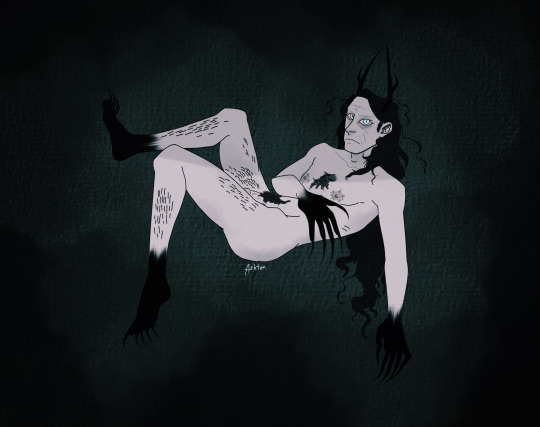
Decided to draw Gríma Wormtongue as a sort of dark fae creature. Mostly I just wanted an opportunity to experiment with poses. And tasteful nudity.
It's been a hot minute since I drew the wretched snake man and it shows, but I had fun!
#gríma wormtongue#grima wormtongue#lotr#lord of the rings#brad dourif#brad dourif characters#faerie#my art#artistic nudity
43 notes
·
View notes
Text

ah, my favorite trope: male manipulator husband and dragon wife
(just a fun lil thing i cooked up for my fic Blood of the Dragon. this is more of a in between scenes thing and just something i thought was cute like yeah they’d totally do that.)
#lord of the rings oc#lotr oc#lotr fanfic#gríma wormtongue#gríma wormtongue x oc#oc art#my ocs#lotr x oc#my fic: blood of the dragon#oc: aelora draecyr#brad dourif#grima wormtongue
9 notes
·
View notes
Text

gríma
#abyss is my screen name in some other places so that’s why that’s the signature 👍#i’m ngl i haven’t read the lotr books or finished watching the movies i just rly like this guy#there’s a severe lack of recent content of him so i’m posting this to provide even tho i’ve been anxious abt sharing my art lately idk why#lotr#lord of the rings#grima wormtongue#gríma wormtongue#art#mausolart#don’t repost pls - if you desperately want it on another platform just lmk and i’ll post it myself
46 notes
·
View notes
Text
I watched "The Lord of the Rings" for the first time yesterday.
I laughed because Brad Dourif looked five times greasier than I expected, but his voice was exactly as usual.
Chapter 3 seems like you can only see him in a special edition, so you'll have to borrow that.
I used to have a weakness for high fantasy, but I want to overcome that.
No matter how creepy he is depicted, I'm overjoyed when he appears.

13 notes
·
View notes
Text
#finding new words#chapter 87#fanfiction#my stuff#grima wormtongue#griomer#look they are having a conversation#or almost anyway#malcontent#grimomer#eomer#ao3 fanfic#ao3#fanfic#rohan#edoras#creative writing#writing#lothiriel#lotr#lord of the rings#wormtongue#gríma wormtongue
3 notes
·
View notes
Text

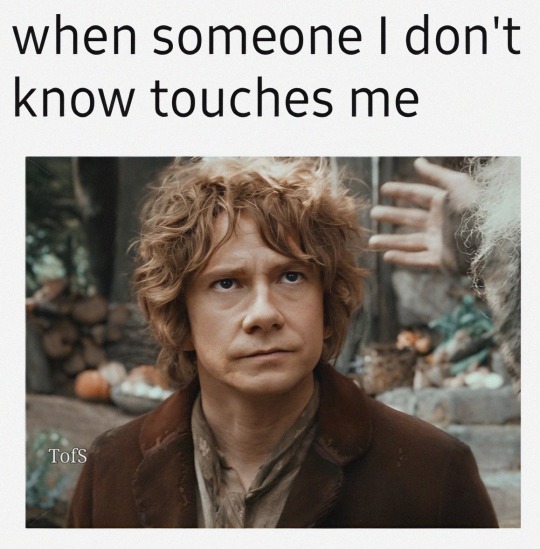


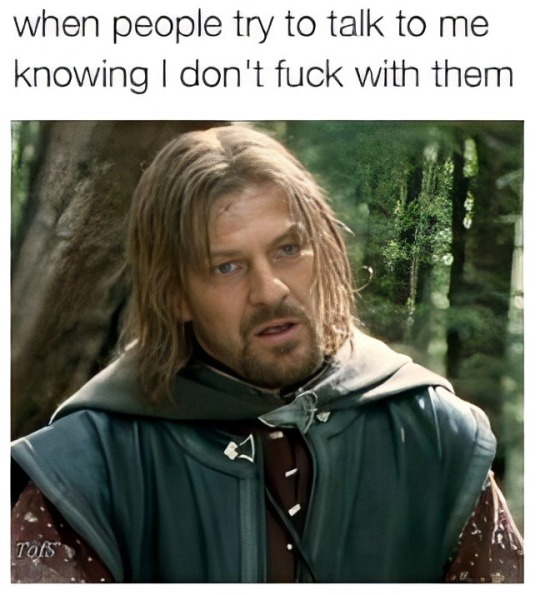
#bilbo#martin freeman#boromir#sean bean#éowyn#miranda otto#aragorn#viggo mortensen#lurtz#lawrence makoare#gothmog#gollom#andy serkis#gríma wormtongue#lotr + relationship memes#hobbit + relationship memes#my edits#craig parker gothmog's voice#craig parker
49 notes
·
View notes
Link
Chapters: 1/1
Fandom: The Lord of the Rings - J. R. R. Tolkien
Rating: Explicit
Warnings: No Archive Warnings Apply
Relationships: Éomer Éadig/Gríma Wormtongue, Gríma Wormtongue & Saruman | Curunír
Characters: Gríma Wormtongue, Éomer Éadig
Additional Tags: Alternate Universe - Canon Divergence, Gríma Wormtongue Lives, Masturbation, Sexual Fantasy, Cock Warming, Hair-pulling, Past Abuse, Dehumanization, (it's set a week after Gríma escapes from Saruman so. you know), Panic Attacks, Hurt/Comfort, (sort of. Éomer is too honourable to be cruel to a mostly dead guy in mental anguish), Body Dysphoria
Summary:
Gríma crawled away from the Wizard Saruman and into the hands of an éored that brought him straight to the new King Éomer. In the room where his starvation and wounds are tended to, he imagines his King asking for a different kind of penance.
#this was real fun to write even though gríma completely derailed my straightforward outline#gríma wormtongue#gríma#grima wormtongue#dimtraces makes things
16 notes
·
View notes
Text
Saruman: ew why are those folk so short?
Gríma: they're hobbits.
Saruman: that's no excuse.
#lord of the rings#lotr#saruman#saruman the white#gríma wormtongue#incorrect quotes#incorrect lotr quotes
12 notes
·
View notes